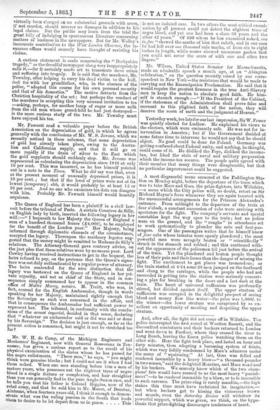The Queen of England has been a plaintiff in a
civil law- suit before the tribunal of Paris. A certain Countess de Silly, as English lady by birth, inserted the following legacy in her will :—" I bequeath to her Majesty the Queen of England a -sum of a hundred thousand francs (L4,000), to be employed for the benefit of the London poor." Her Majesty, being informed through diplomatic channels of the circumstance, accepted the legacy. Thereupon the residuary legatee sug- gested that the money might be remitted to Madame de Silly's relations. The Attorney-General gave contrary advice, on the just plea that these relatives were by no means poor. Lord Cowley having received instructions to get in the bequest, the heirs refused to pay, on the pretence that the Queen's signa- ture was not duly authenticated by a regular power of attorney. `The heirs contended for the nice distinction that the legacy was bestowed on the Queen of England in her pri- vate capacity, and not as chief of the State, and in con- sequence simply summoned her to appear in the common -office of Maitre Marcq, notaire. M. Treitt, who was, in fact, counsel for the English Ambassador, though in words speaking for her Majesty, maintained rightly enough that the Sovereign as such was concerned in the affair, and that in consequence the Ambassador had sufficient power to represent her. The tribunal, in conformity with the conclu- sions of the avocat imperial, decided in that sense, declaring that " whatever an ambassador said or did was said or done by his Sovereign." The decision is just enough, as far as the present action is concerned, but might it not be stretched too far?






























 Previous page
Previous page